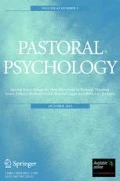Abstract
The current investigation evaluated psychological and personality profiles of successful applicants to the deaconate in several Roman Catholic dioceses in California. The MMPI-2 and 16PF were administered to 25 applicants between 2004 and 2006 who subsequently entered the permanent deaconate program. Results indicate that these applicants to the deaconate were generally well-adjusted as well as being socially responsible. Findings also suggest some tendency for defensiveness, repression, naivete, and a strong need for affection, as well as for being emotionally stable, genuine, and cooperative.


Similar content being viewed by others
References
Center for Applied Research in the Apostolate, Georgetown University (2006). Frequently asked questions. Catholic Church statistics. Washington, DC: Author.
Cattell, R. B., Cattell, A. K., & Cattell, H. E. P. (1993). Sixteen Personality Factors Questionnaire (5th ed.). Champaign, IL: Institute for Personality and Ability Testing.
Cozzens, D. (2000). The changing face of the priesthood. Collegeville, MN: The Liturgical Press.
Dix, K. (2005). What’s a Deacon to do? U.S. Catholic, 70, 47 April.
Gafford, J. S. (2000). Variations in psychological functioning among Roman Catholic religious professionals. Doctoral Dissertation, Saint Louis University, 2000. Dissertation Abstracts International, 62, 547.
Gary, M. M., & Gautier, M. L. (2004). Profile of the diaconate in the United States: A report of findings from CARA’s deacon poll (A report originally prepared for the Secretariat for the Diaconate of the United States Conference of Catholic Bishops). Washington, DC: Center for Applied Research in the Apostolate, Georgetown University.
Hathaway, S. R., & McKinley, J. C. (1989). Manual for the Minnesota Multiphasic Personality Inventory-2™ (MMPI-2™). Minneapolis, MN: University of Minnesota.
Kosek, R. B. (2000). The desire for God: An assessment of seminarians’ spirituality through the lens of the “big five.” Pastoral Psychology, 49, 43–50.
Plante, T. G., Aldridge, A., & Louie, C. (2005). Are successful applicants to the priesthood psychologically healthy? Pastoral Psychology, 54, 81–89.
Schoenherr, R. A., Young, L. A., & Vilarino, J. P. (1988). Demographic transitions in religious organizations: A comparative study of priest decline in Roman Catholic diocese. Journal for the Scientific Study of Religion, 27, 499–523.
Author information
Authors and Affiliations
Corresponding author
Rights and permissions
About this article
Cite this article
Plante, T.G., Lackey, K. Are Successful Applicants to the Roman Catholic Deaconate Psychologically Healthy?. Pastoral Psychol 55, 789–795 (2007). https://doi.org/10.1007/s11089-007-0081-2
Published:
Issue Date:
DOI: https://doi.org/10.1007/s11089-007-0081-2



